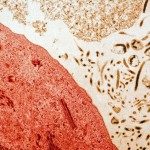Lien vers Pubmed [PMID] – 21722250
Clin. Microbiol. Infect. 2011 Jul;17(7):964-76
Ebola and Marburg viruses are the only members of the Filoviridae family (order Mononegavirales), a group of viruses characterized by a linear, non-segmented, single-strand negative RNA genome. They are among the most virulent pathogens for humans and great apes, causing acute haemorrhagic fever and death within a matter of days. Since their discovery 50 years ago, filoviruses have caused only a few outbreaks, with 2317 clinical cases and 1671 confirmed deaths, which is negligible compared with the devastation caused by malnutrition and other infectious diseases prevalent in Africa (malaria, cholera, AIDS, dengue, tuberculosis …). Yet considerable human and financial resourses have been devoted to research on these viruses during the past two decades, partly because of their potential use as bioweapons. As a result, our understanding of the ecology, host interactions, and control of these viruses has improved considerably.
